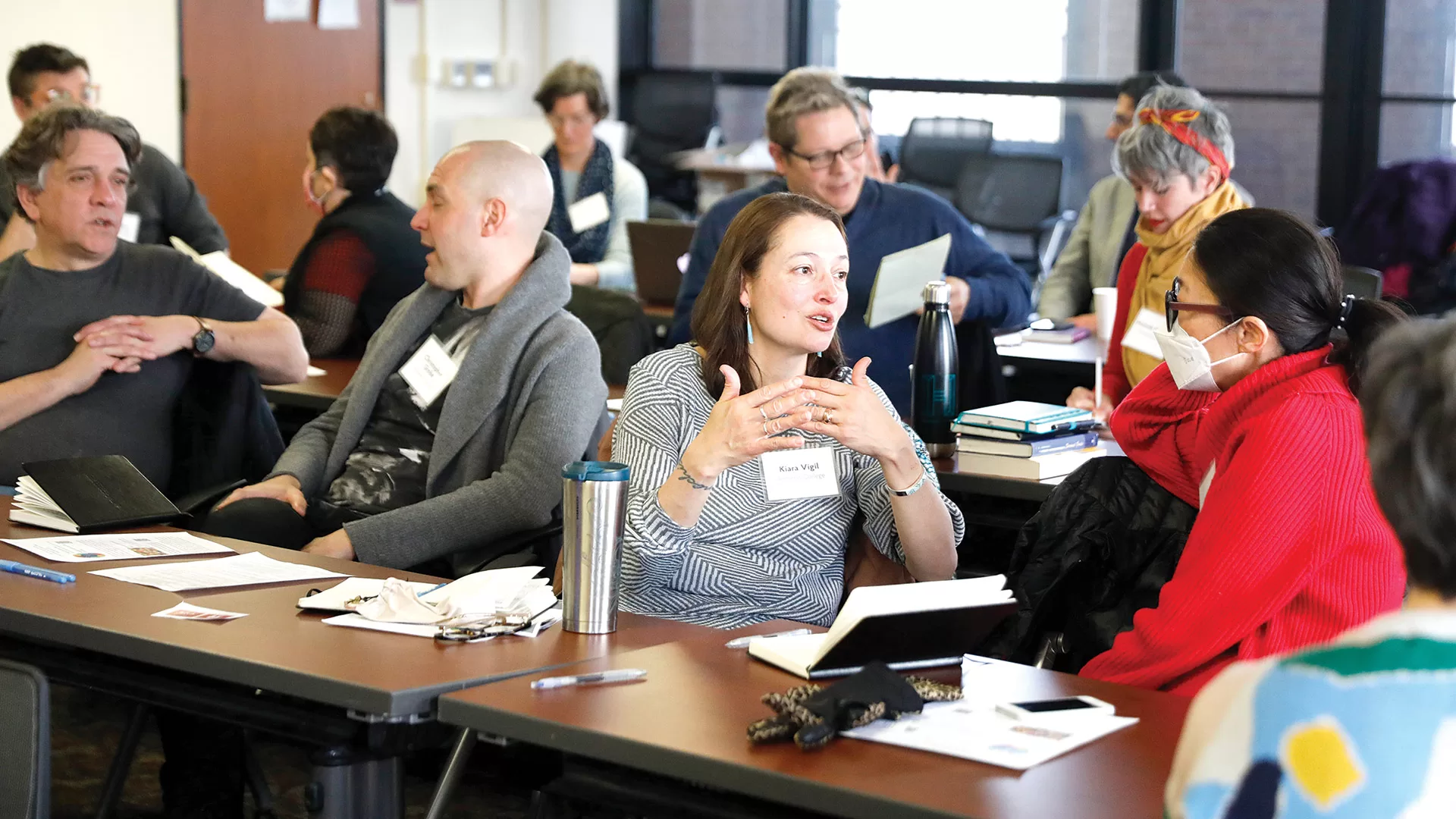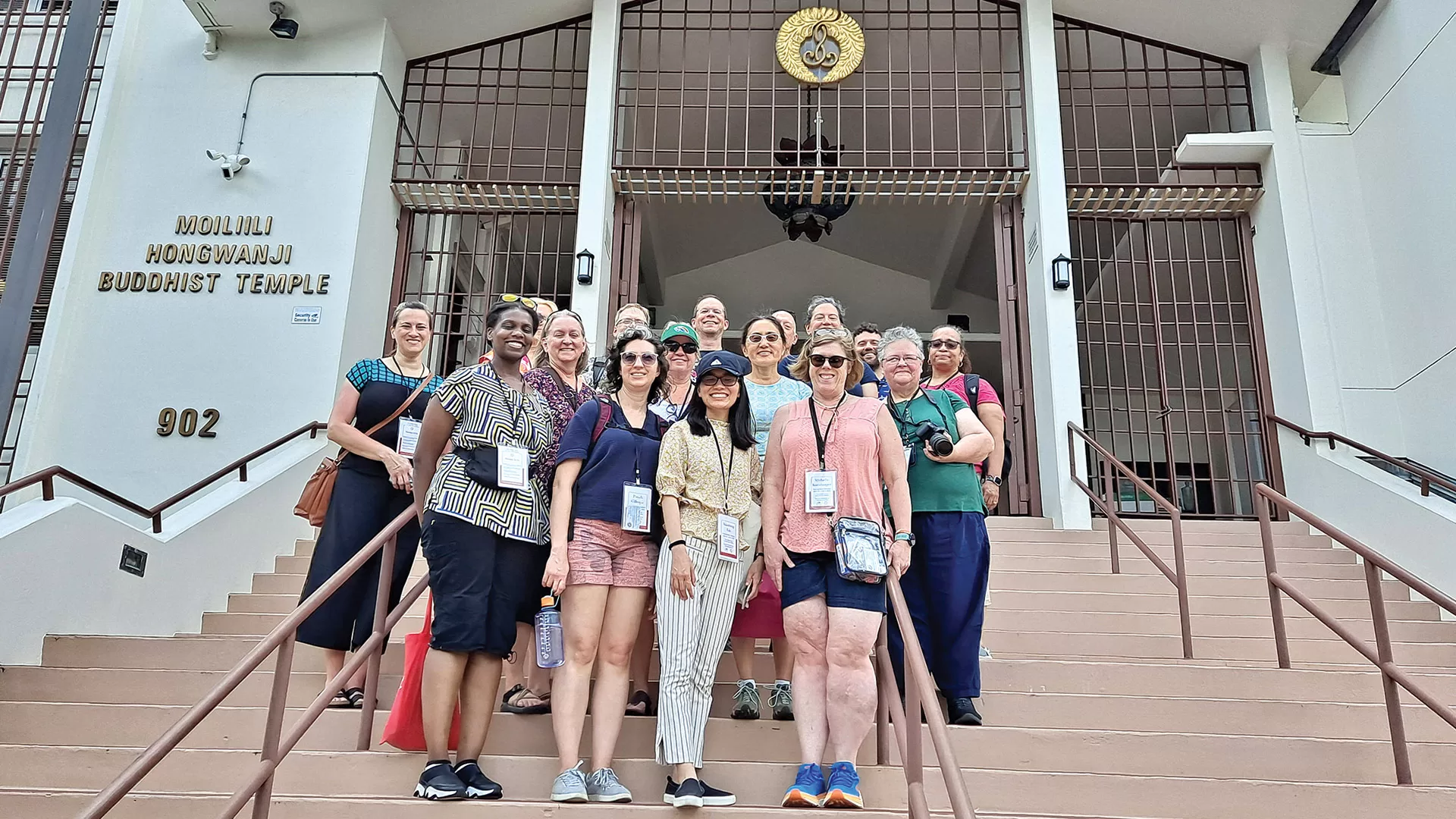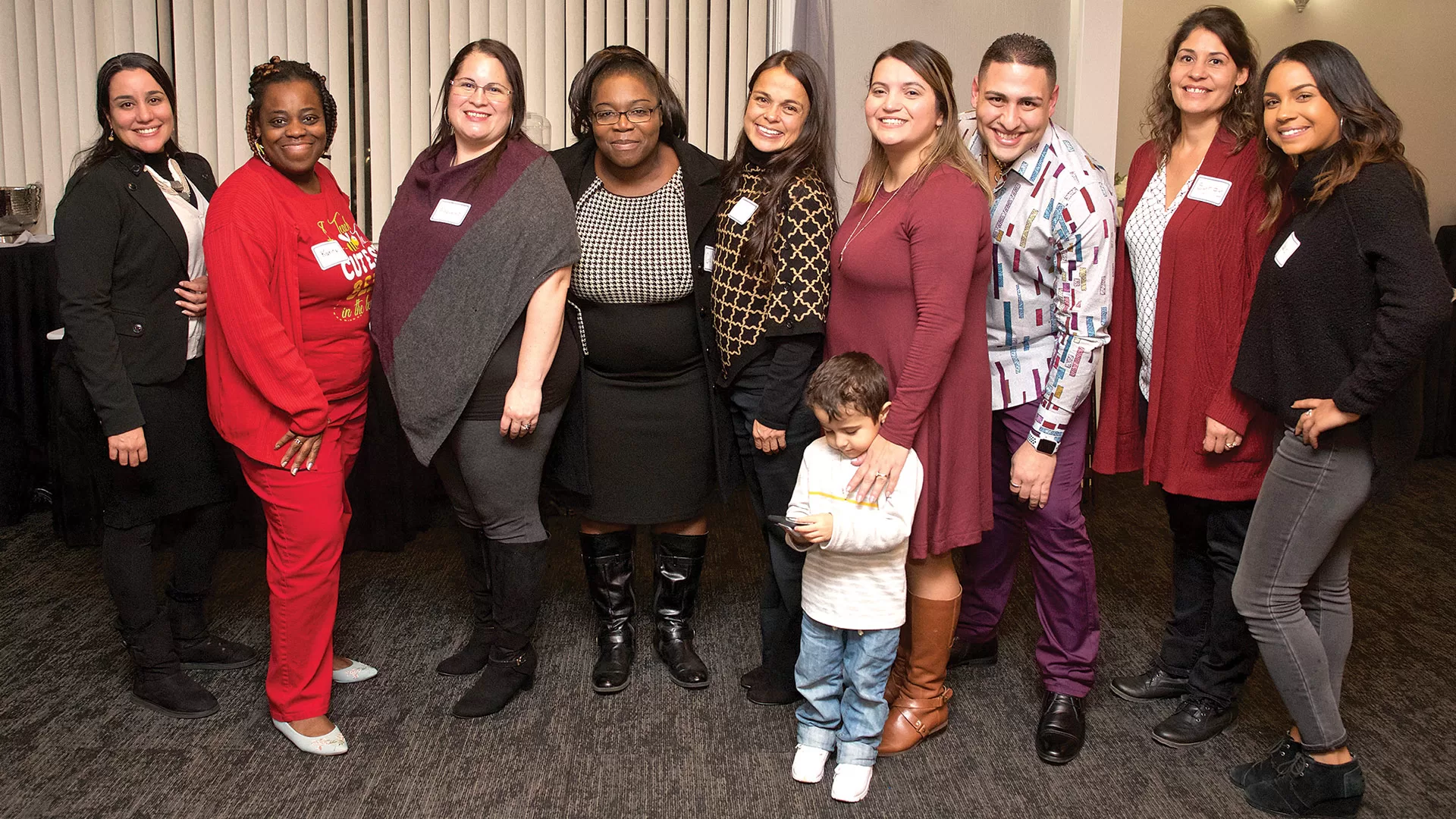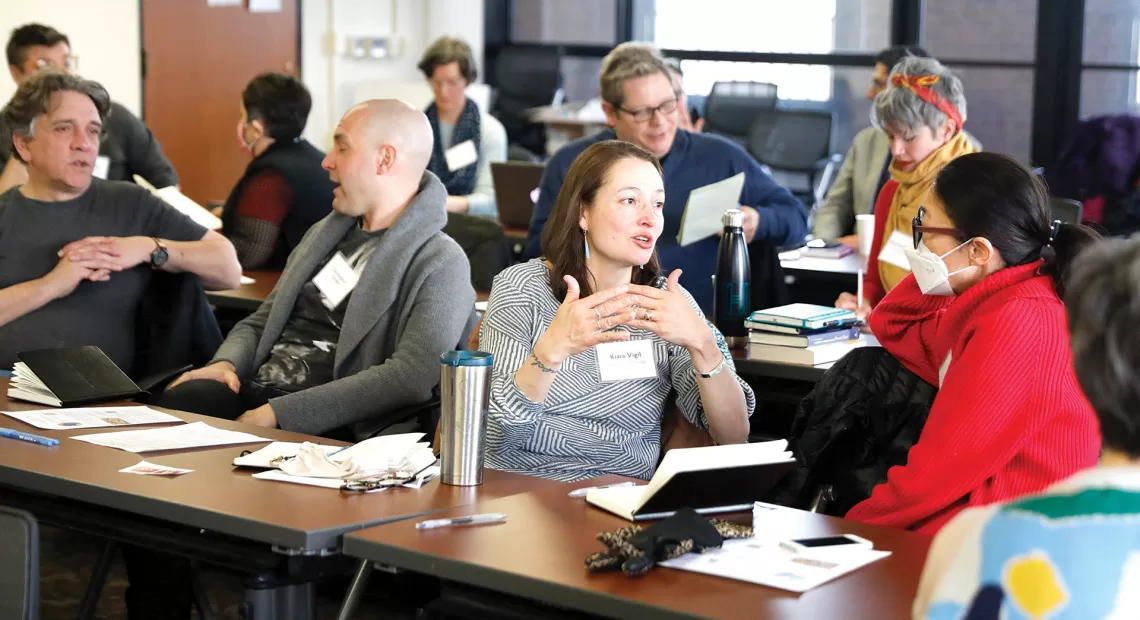Turning Ideas into Reality

Faculty members from all five campuses meet together in a workshop at UMass Amherst as part of a program called Building Academic Leaders in the Humanities Program.
(Photo by Dan Little)
Ina Clark recalls her experience working for the Smithsonian Design Museum in New York City, which was not a job performed in a vacuum.
“You’re not only working on your own museum, but also collaborating with the development offices of all the Smithsonian museums — and not only juggling all that, but finding positive ways for those relationships to work,” she told BusinessWest. “I love working with people to grow things, producing results they wouldn’t achieve otherwise.”
She brings the same mindset to her new role as director of Development and Sponsored Programs at the Five Colleges Consortium in Amherst, an organization that, for decades, has convened the resources of Amherst College, Hampshire College, Mount Holyoke College, Smith College, and UMass Amherst to increase the capacity of those institutions to create educational opportunities both on and off campus.
“Not everyone has the same strengths in everything, and there are certain things they wouldn’t have the budget or structure to take on,” Clark said of the five campuses, adding that this dynamic is exciting to her, in that it necessitates the collaborative work Five Colleges specializes in. “It allows some students to get experiences and opportunities they wouldn’t have on their own campus, but can have because this exists.”
Executive Director Sarah Pfatteicher agreed. “I feel like the work we do is particularly valuable and powerful at a moment that feels very divisive,” she said. “Particularly after the pandemic, we’ve all been so focused inwardly. This is all about getting people in a room to think in a bigger-picture way than they do alone, or accomplish collectively what they couldn’t do themselves — just get outside their individual interests and think of the collective good.”
And it’s a good that impacts the broader community outside the campuses, she added. “We have deep connections to our communities. The campuses can’t be healthy without healthy communities. It’s a symbiotic, mutually supportive relationship, and it’s a lovely thing.”
Clark’s nonprofit background is extensive; besides the Smithsonian Design Museum, she has worked in development at Jacob’s Pillow Dance Festival, Cooper Hewitt, the Ms. Foundation for Women, and Sesame Workshop. She also recently served as interim director of SPCA International, an animal-protection organization.
“This is all about getting people in a room to think in a bigger-picture way than they do alone, or accomplish collectively what they couldn’t do themselves — just get outside their individual interests and think of the collective good.”
At Five Colleges, “one of the many things I have found terrific in this opportunity is that you have these very brilliant people who are quite different from each other, and these campuses that are close by but have different perspectives on things, different points of view, and we have a way to pull it all together and brainstorm an idea into a stronger idea, to consider what’s possible,” Clark said.
“That’s a truly amazing idea, and hard to find in a world where people have been isolated. We have this opportunity to throw out an idea and see what happens with it because we have this network that exists around us.”
Gradual Growth
Historically, Pfatteicher said, the campuses have been collaborating since at least 1914, but Five Colleges officially became a 501(c)(3) in 1965. “For many years after that, it was a very small organization. So it’s been 110 years of growth to get to where we are now, with our staff, budget, and all the things we have in place.
“Our whole reason for existing is to help facilitate collaborative efforts between the campuses,” she went on. “Everything the campuses want to do together, however we can help them collaborate, our job is to figure out how to do that.”
External funding, mainly in the form of grants, makes up about 15% of the budget, paying for a series of sponsored programs, said Kevin Kennedy, director of Strategic Engagement at Five Colleges.

K-12 teachers from the Center for East Asian Studies visit the Mo’ili’ili Hongwanji Buddhist Temple in Honolulu.
(Photo by Anne Prescott)
“The vast majority of our work on the campuses is with things other than the sponsored programs — cross-registration, extensive academic program support, student research … a wide variety of areas.”
That includes a lot of academic programming, sharing curricula and faculty, some back-office and administrative operations, risk management, insurance, and shared fiber-optic network contracts, Pfatteicher noted.
“The majority of our annual budget comes directly from the campuses in the form of assessments which basically say, ‘here’s a list of the things you told me what you want to do next year, and this is what it will cost each of you.’ We have a very detailed formula about who pays for which amount, but the budget comes from the campuses.”
“People will be able to research thousands, even tens of thousands of museum objects that aren’t nearly as accessible to them with the current system.”
Clark, on the other hand, will focus mainly on the consortium’s broad portfolio of sponsored programs, which most recently includes grants from the Mellon Foundation for expanding the Native American and Indigenous Studies curricula of its member campuses and for creation of a faculty leadership-development program, as well as a host of other programs:
• Paradigm Shift is a scholarship partnership program supported by a coalition of more than 30 school districts, universities, and community organizations, aimed at helping Black and Latinx para-educators become licensed teachers.
“The focus is on creating a more diverse teaching workforce,” Pfatteicher said. “It takes people who are already in the classroom and progresses them in their career. It isn’t something that one campus can do by itself, and even Five Colleges couldn’t do it alone, but our job is to get the right people in the room — superintendents, identified para-educators, teacher training programs, someone to manage grant funding … it takes a village, if you will.”
“That’s a perfect example of the work being done here in a collaborative way,” Clark added. “It goes beyond the five campuses and has a tremendous regional benefit.”
• The Center for East Asian Studies in Northampton supports K-12 teachers in learning, and then teaching about, East Asia. It draws on the resources of the Five College member campuses to conduct seminars, institutes, conferences, and workshops.
• Learning in Retirement is a group of retirees, mainly from the field of education, who provide peer education to one another. “It started with faculty members moving into retirement who wanted to stay involved and wanted to help each other, but the membership has gone beyond that,” Clark said.
• Five Colleges also received funding from the National Endowment for the Humanities to support an upgrade of six museum collections and cataloging systems — five from the member colleges and also Historic Deerfield.
“This effort will help the museums to better their collections, and allow them to share their collections with the world,” Kennedy said. “People will be able to research thousands, even tens of thousands of museum objects that aren’t nearly as accessible to them with the current system.”
Those are just a few of the ongoing initiatives. While some of these programs exist for the long run, others — like the museum project — will eventually meet a goal and then end. Meanwhile, ideas for new collaborations continue to be generated by the colleges themselves.

Participants in the Paradigm Shift program, which helps para-educators of color in local K-12 schools earn their teacher’s licenses.
(Photo by Ben Barnhart)
“For the most part, the campuses come here with a project they’d like to undertake: ‘can you help us find funding for this one?’” Pfatteicher explained. “Or one campus might come forward and say, ‘we’ve been talking to a funder about a program, and it occurred to us it might be more powerful to do it collectively.’ So they hand over that conversation with the funder to Five Colleges, and we seek funding.”
And new concepts — and discussions — are always emerging, Clark said. “Ideas can come from one campus, and we help bring it to the full group.”
Strength in Numbers
Pfatteicher emphasized that many valuable programs, especially of the collaborative nature, couldn’t be accomplished without a central convener like the Five College Consortium.
“Campuses in theory can run these things on their own, but the more complicated, detailed collaborations are harder,” she noted, adding that even helping students on one campus find what courses are offered on another, and helping them access those resources, is a much-improved process when Five Colleges is involved.
“Something as simple as cross-registration has a whole set of things you need to accomplish,” she added. “We happen to specialize in being the glue in the middle that helps pull it all together.”
Kennedy agreed. “The three campuses, individually, are overextended; they simply don’t have the funding to do all these programs. Five Colleges gives them an opportunity to access things they may not be able to access otherwise as a group.”






